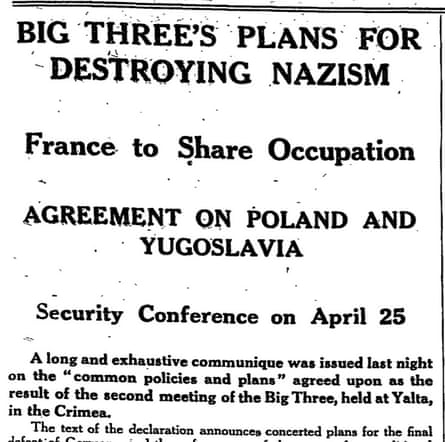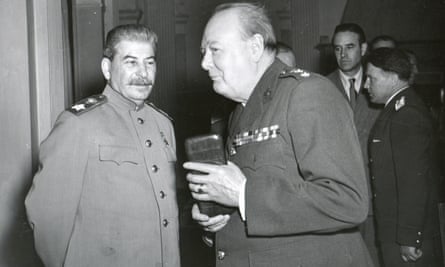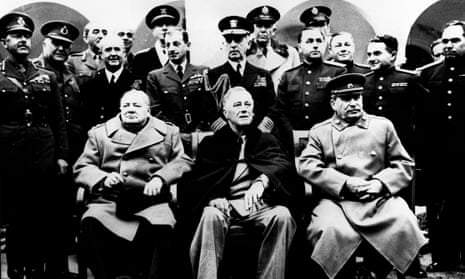Control of Germany by the Great Powers
By our Diplomatic Correspondent
13 February 1945
London, Monday
It was disclosed to-night that the conference of the three heads of government of the United States, the USSR, and Great Britain, with their Foreign Secretaries, Chiefs of Staff, and other advisers, have been in session for eight days at Yalta, in the Southern Crimea.
Marshal Stalin, lunching on the first day of the meeting with President Roosevelt and Mr Churchill, proposed the toast of the “Crimean Conference,” and it is by this name it will now be known.
The Casablanca formula
The Allied leaders and their advisers have dealt, above all, with the three main aspects of the European Situation. First they decided upon the co-ordination of military plans that are to bring about Germany’s defeat. Secondly, agreement was reached upon the handling of the transition period that will follow the end of centralised German resistance. Thirdly, the pressing political and social problems of Europe came under consideration.

Military decisions will of course be revealed only on the field of operations. It is significant, however, that it has been agreed that further staff meetings between the three Powers are to take place whenever the need arises. The need applies to developments in the war against Germany; more especially, perhaps, to the incalculable incidence of prolonged and dispersed warfare after the real power of the centralised German Army has been broken.
National Socialist Germany, as the communique says, is doomed, and the Allied leaders have reaffirmed their determination to impose on the Germans the Casablanca formula of unconditional surrender.
Each of the powers will occupy a separate zone of Germany, but administration control will be co-ordinated through a central control commission consisting of the Supreme Commanders of the three Powers, with headquarters in Berlin. This certainly sounds reassuring, since it suggests a common policy of occupation and should eliminate the danger of a division into three completely different systems of occupation.
France is to be invited to join in the occupation of Germany. The definition of her zone is to be left to the decision of the representatives of the four Powers on the European Advisory Commission. No mention has been made of any of our other European allies.
This is an edited extract. Read the article in full.
London correspondence: at Yalta
13 February 1945
A friend of mine who has heard from one who was at the historic Yalta Conference tells me that the work there was not carried on without many physical difficulties. The Russians were not quite prepared for such big delegations from the American and British sides, but they did a wonderful job to make suitable accommodation available. The trouble was that Yalta is quite a small town, and much devastated at that. The Russians had only a few weeks’ notice, and they had been compelled to house the British and American officials in other towns ten or twelve miles away. Nearly all of these were on the seaside and connected by somewhat mountainous roads. Much time was therefore spent in motor-cars when British delegates wished to meet with their American and Russian opposite numbers.
The official, who lived in a sanatorium with a number of other British experts said that the food was excellent and in the Russian style. He shunned the vodka but made up with the excellent wines of the Crimea. At formal dinner parties hors d’oeuvres entered largely into the menu. An American colonel told my friend that at the end of the conference he had consumed well over 12lb of caviare.
The Reception
All the Russian delegates were in magnificent uniforms which quite eclipsed the drab “civvies” of the British and Americans. Moreover, there were large contingents of Soviet troops, who lined all the roads and were very smart and saluting every car as it passed. Our officials felt their right arms getting stiffer and stiffer after so much exercise.

Editorial: a common plan
14 February 1945
The statement by the Big Three has had a good press. It has been welcomed by all the United Nations, and even in Germany, which may be counted a fault, it appears to have fallen in nicely with the propaganda of Dr Goebbels. Be that as it may, it can be said of this document (and it is a rare tribute) that the more it is studied the better it looks.
Apart from the military plans, the statement falls naturally into three parts: the Declaration on Liberated Europe, the treatment of Germany, and the organisation of a new League of Nations. If one were so rash as to attempt to dissect the trinity, one would guess that the first is the triumph of President Roosevelt, the second of Marshal Stalin, and the third of Mr Churchill. For throughout the diplomacy of the war it has been Mr Churchill’s great achievement, for which he has unjustly been criticised, to reconcile the very different outlooks of Russia and America. If, as we hope, the Big Three have at last achieved a true unity of purpose, the credit must go largely to him. President Roosevelt went to Yalta with the knowledge that Americans would never support a peace which did not to some extent fit in with their ideas of justice and self-government. Americans, for instance, stand on the Atlantic Charter – and Mr Roosevelt has succeeded in getting the Charter reinstated with generous quotations. Americans interpret democracy, as we do, in terms of votes and Parliamentary government – and Mr Roosevelt has insisted that in all the liberated countries (and this presumably goes for the reluctant Marshal Tito as well as for Poland) there shall be “the earliest possible establishment through free elections of Governments responsive to the will of the people.” Americans believe that where possible the drawing of frontiers shall be left to the peace conference, and here too, in the case of Poland, Mr Roosevelt has had his way. It is a victory not only for Mr Roosevelt but for democracy.
